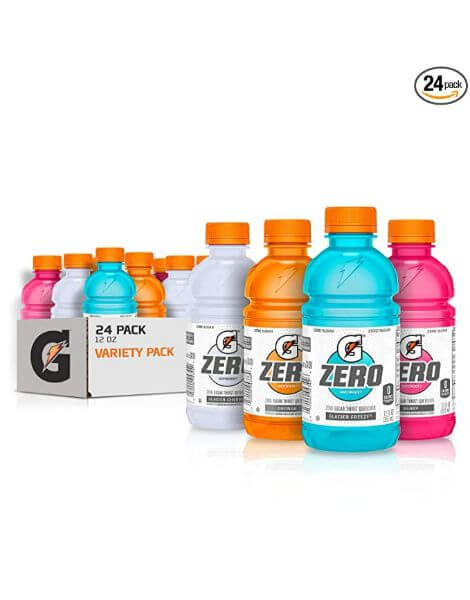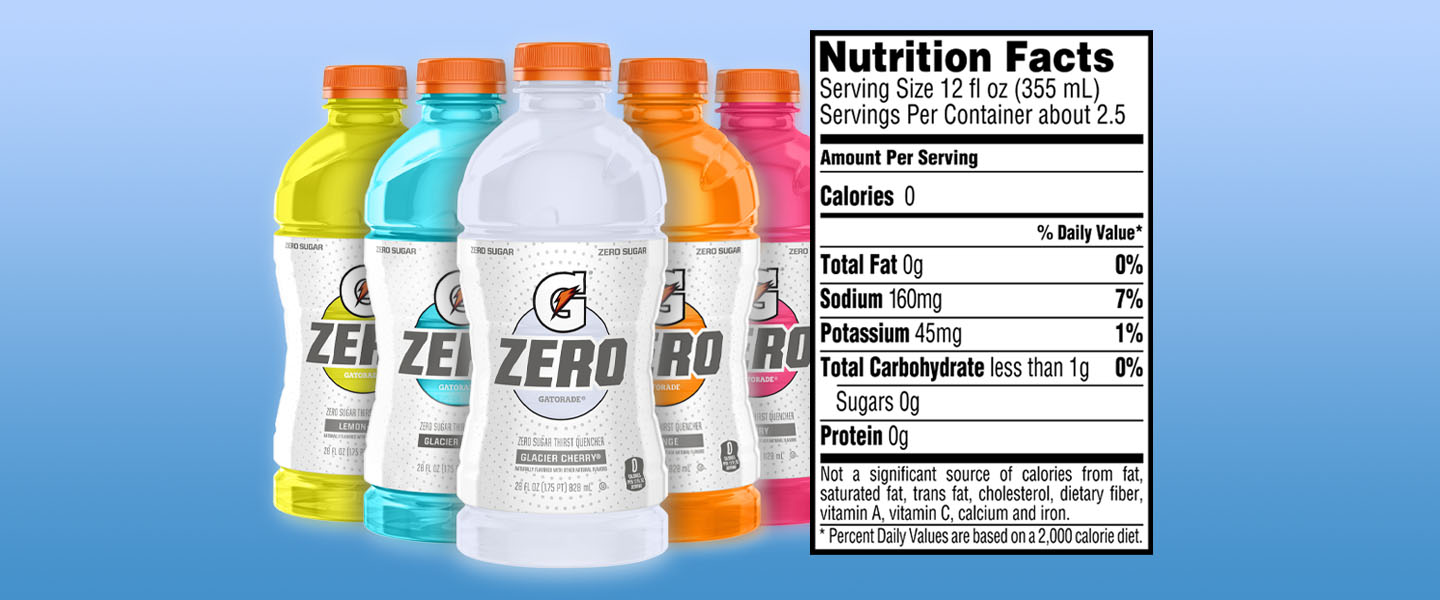Yes, Zero Sugar Gatorade can be good for you. It offers hydration without the added sugar.
But, it’s important to understand its pros and cons. In today’s world, many people seek healthier drink options. Zero Sugar Gatorade claims to provide hydration and electrolytes without the extra calories. But is it really a good choice for your health?
We will look at the ingredients, benefits, and possible drawbacks. This will help you decide if Zero Sugar Gatorade fits into your healthy lifestyle. Let’s explore if this drink is right for you.

Credit: www.epicwaterfilters.com
Introduction To Zero Sugar Gatorade
Many people seek healthier alternatives to their favorite drinks. One such option is Zero Sugar Gatorade. This beverage promises to deliver the same refreshing taste without the added sugar. But is it really good for you? This blog post will explore the details of Zero Sugar Gatorade, its popularity, and market demand.
What Is Zero Sugar Gatorade?
Zero Sugar Gatorade is a sports drink made by Gatorade. It is designed for those who want to stay hydrated without consuming sugar. The drink contains electrolytes and flavors similar to the original Gatorade but has zero sugar.
Here is a quick comparison:
| Feature | Original Gatorade | Zero Sugar Gatorade |
|---|---|---|
| Sugar Content | 34 grams | 0 grams |
| Calories | 140 | 10 |
| Electrolytes | Yes | Yes |
Popularity And Market Demand
There is a growing demand for healthier drink options. People are more health-conscious and prefer low-sugar beverages. Zero Sugar Gatorade meets this demand.
Here are a few reasons for its popularity:
- Health benefits: No added sugar.
- Taste: Similar to original Gatorade.
- Hydration: Contains essential electrolytes.
Market trends show an increase in the sales of zero sugar drinks. Consumers are choosing these options for better health and fitness. Zero Sugar Gatorade is a popular choice among athletes and fitness enthusiasts.
Nutritional Profile
Zero Sugar Gatorade is a popular choice for those wanting to stay hydrated. But, is it really good for you? Let’s dive into its nutritional profile to find out.
Ingredients Breakdown
Zero Sugar Gatorade contains water, citric acid, and natural flavors. It has sucralose and acesulfame potassium as sweeteners. These sweeteners replace sugar but keep the drink sweet. There are also electrolytes like sodium and potassium. These help with hydration and muscle function.
Calorie Content
One of the key benefits of Zero Sugar Gatorade is its low calorie count. A serving has only 5 calories. This makes it a great option for those watching their calorie intake. It provides the hydration and electrolytes you need without extra calories.
Health Benefits
Zero Sugar Gatorade has gained popularity for its potential health benefits. This drink offers key advantages for those seeking healthier hydration options. Let’s explore the health benefits of Zero Sugar Gatorade.
Electrolyte Balance
Zero Sugar Gatorade helps maintain electrolyte balance in the body. Electrolytes are vital for normal muscle function and nerve activity. Zero Sugar Gatorade contains essential electrolytes like sodium and potassium. These elements help prevent muscle cramps and fatigue during exercise. Keeping your body’s electrolyte levels stable is crucial for overall health.
Hydration Support
Zero Sugar Gatorade is effective in supporting hydration. Hydration is important, especially during physical activities. This drink replenishes lost fluids quickly. It helps you stay hydrated without added sugars. This makes it a healthier choice compared to regular sugary drinks.
Let’s compare the benefits in a simple table:
| Benefit | Zero Sugar Gatorade | Regular Sugary Drinks |
|---|---|---|
| Electrolyte Balance | Yes | No |
| Hydration Support | Yes | Yes |
| Sugar Content | Zero | High |
In summary, Zero Sugar Gatorade offers key health benefits. It maintains electrolyte balance and supports hydration without added sugars.

Credit: www.garagegymreviews.com
Potential Drawbacks
Zero Sugar Gatorade offers a low-calorie alternative to regular sports drinks. Yet, some concerns exist about its ingredients. Let’s explore the potential drawbacks.
Artificial Sweeteners
Zero Sugar Gatorade contains artificial sweeteners like sucralose and acesulfame potassium. These sweeteners provide the drink’s sweetness without adding calories. While they are generally recognized as safe by the FDA, some studies suggest potential health risks.
- Sucralose: Found in many diet products. Some research links it to gut health issues.
- Acesulfame Potassium: Another common sweetener. Some studies suggest it may affect insulin response.
Artificial sweeteners might also impact taste preferences. Regular consumption could lead to a preference for sweeter foods and drinks. This could make it harder to enjoy naturally sweetened options.
Possible Side Effects
Some people may experience side effects from artificial sweeteners. These side effects can vary based on individual sensitivity and consumption levels.
| Sweetener | Possible Side Effects |
|---|---|
| Sucralose | Digestive issues like bloating and gas. |
| Acesulfame Potassium | Potential headaches and dizziness. |
Consuming Zero Sugar Gatorade in moderation may minimize these risks. It’s important to listen to your body and note any adverse reactions.
In summary, while Zero Sugar Gatorade offers a low-calorie option, the presence of artificial sweeteners and their potential side effects warrant caution.
Comparing To Regular Gatorade
Is Zero Sugar Gatorade good for you? This question arises when we compare it to Regular Gatorade. Both drinks cater to athletes and fitness enthusiasts, yet they differ in their nutritional profiles. Let’s explore how Zero Sugar Gatorade stacks up against its regular counterpart.
Sugar Content
Regular Gatorade contains a significant amount of sugar. A 20 oz bottle has about 34 grams of sugar. This sugar provides quick energy but can lead to a crash later. It also adds extra calories that might not be needed.
Zero Sugar Gatorade, on the other hand, contains no sugar. It uses artificial sweeteners like sucralose and acesulfame potassium. These sweeteners provide the taste without added calories or sugar.
| Gatorade Type | Sugar Content | Calories |
|---|---|---|
| Regular Gatorade | 34 grams | 140 |
| Zero Sugar Gatorade | 0 grams | 0 |
Overall Nutritional Differences
Beyond sugar, these drinks have other nutritional differences. Regular Gatorade provides a mix of electrolytes, including sodium and potassium. These help replenish what is lost through sweat.
Zero Sugar Gatorade also contains electrolytes. It maintains similar levels of sodium and potassium. This ensures hydration without the added sugar and calories. Here is a quick comparison:
| Nutrient | Regular Gatorade | Zero Sugar Gatorade |
|---|---|---|
| Calories | 140 | 0 |
| Sodium | 270 mg | 270 mg |
| Potassium | 75 mg | 75 mg |
| Sugar | 34 grams | 0 grams |
In conclusion, Zero Sugar Gatorade offers a sugar-free alternative with similar electrolyte benefits. It is a suitable choice for those who want hydration without extra calories.

Credit: mexicobariatriccenter.com
Expert Opinions
Is Zero Sugar Gatorade good for you? Expert opinions can help answer this question. Let’s dive into the insights from nutritionists and athletes.
Nutritionists’ Views
Nutritionists appreciate Zero Sugar Gatorade’s low calorie content. This drink helps those watching their weight. It doesn’t add extra sugar to the diet.
Some nutritionists, though, point out the presence of artificial sweeteners. These may have unwanted effects for some people. It’s important to consider individual tolerance.
Athletes’ Experiences
Athletes often choose Zero Sugar Gatorade for hydration. The drink replenishes electrolytes lost during intense workouts. It helps maintain performance without extra calories.
Yet, some athletes miss the energy boost from sugar. They may need a different source of quick energy. Each athlete has unique needs and preferences.
Consumer Reviews
Zero Sugar Gatorade has gained attention among health-conscious consumers. People want to know if it is worth the hype. Reading consumer reviews can help make an informed choice.
Positive Feedback
Many people appreciate the low-calorie content. They find it refreshing during workouts. Some users enjoy the variety of flavors. They say it tastes good without the sugar.
Others mention that it helps them stay hydrated. They like that it doesn’t spike blood sugar levels. Athletes often praise its electrolyte balance. It helps them recover after intense exercise.
Negative Feedback
Some users feel it has an artificial taste. They miss the sweetness of the original. A few people report stomach discomfort. This could be due to the artificial sweeteners used.
Others question its health benefits. They worry about the long-term effects of artificial ingredients. Some reviews mention that it doesn’t hydrate as well as the regular version.
In summary, consumer reviews offer mixed opinions. Positive feedback highlights its low-calorie content and refreshing taste. Negative feedback points to concerns about taste and ingredients.
Frequently Asked Questions
Is Zero Sugar Gatorade Healthy?
Zero Sugar Gatorade is a healthier option compared to regular Gatorade. It has fewer calories and no sugar. However, it contains artificial sweeteners and flavors which may not suit everyone.
Does Zero Sugar Gatorade Hydrate Well?
Yes, Zero Sugar Gatorade hydrates effectively. It contains electrolytes like sodium and potassium. These help replenish what you lose through sweat during workouts.
Can Diabetics Drink Zero Sugar Gatorade?
Diabetics can drink Zero Sugar Gatorade. It contains no sugar, which helps manage blood sugar levels. Always consult your doctor before making any changes to your diet.
What Are The Ingredients In Zero Sugar Gatorade?
Zero Sugar Gatorade contains water, electrolytes, artificial sweeteners, and flavors. Key electrolytes include sodium and potassium. Always check the ingredient list for any potential allergens.
Conclusion
Zero Sugar Gatorade can be a good option. It provides hydration without sugar. This can benefit those watching their sugar intake. The drink also offers electrolytes. These help in maintaining balance during exercise. Always consider your dietary needs. Consult with a healthcare professional if unsure.
Remember, moderation is key. Stay hydrated and make informed choices.
